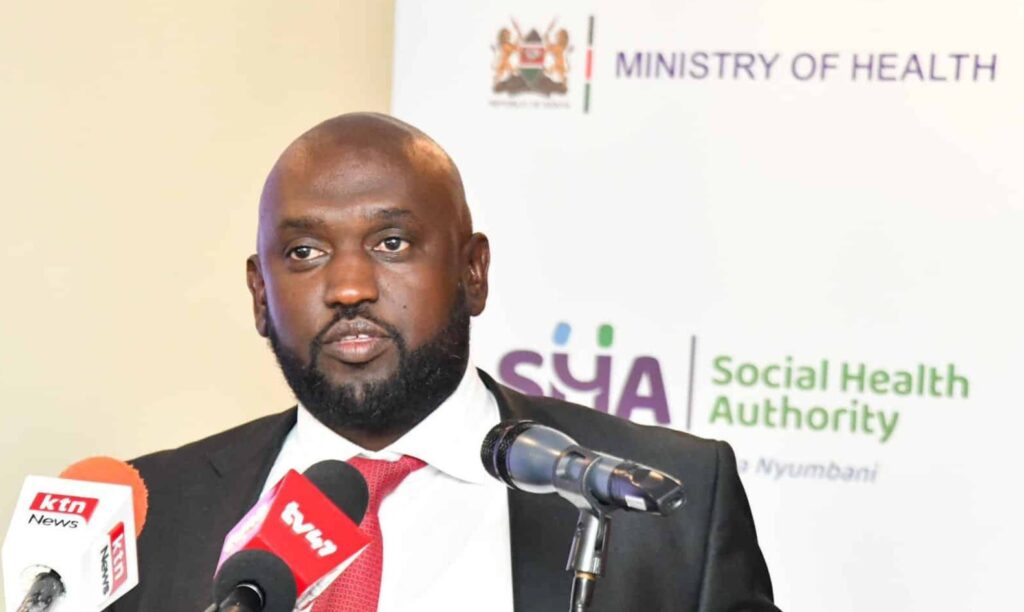Kenya’s Social Health Authority (SHA) was launched in October 2024 as a bold solution to the NHIF’s long-standing failures. Yet in less than a year, SHA is embroiled in a scandal so deep it risks becoming a symbol of systemic corruption in public health.
Critics now warn SHA is not a reform but a “cartelized cash cow” serving the politically connected, at the expense of sick Kenyans.
Key Villains: 40 Suspended Hospitals Across 12 Counties
In August 2025, SHA’s CEO, Dr. Mercy Mwangangi, officially published a gazette notice listing 40 health facilities suspended for allegedly engaging in fraudulent practices under Section 48(6) of the Social Health Insurance Act, 2023 .
The hospitals span at least 12 counties, with suspicious billing ring concentrated in key regions:
Nairobi (10 facilities)
ABM Specialized Hospital
Bristol Park Hospital – Fedha
Imara Healthcare Centre
Salama Yard Medical Centre
Vebeneza Medical Centre – Tassia and others .
Mandera (8 facilities)
Al-Masry Nursing Home Ltd
Rhamu Dimtu Medical Centre
Care Connect Hospital
Zamzam Nursing Home Rhamu Ltd and more, totaling eight private facilities .
Western Kenya (Bungoma, Kakamega, Busia – 9 facilities)
The Webuye Hospital Ltd, Lifecare Hospitals Bungoma Ltd in Bungoma
Zion Ahadi Mediclinic (Butere), Oasis Doctors Plaza Kakamega Ltd in Kakamega
Tanaja Hospital Ltd and Brimaka Hospital Limited in Busia .
Nyanza (Homa Bay – 6 facilities)
Rachuonyo County Hospital
Queen Rivers Medical Centre and others in Homa Bay.
Other counties affected include:
Kisumu (2)—Nissi Medical Centre, Dawa Front Healthcare
Wajir (2)—Walalaha Nursing Home, New Manyalo Nursing Home
Kajiado (1)—Lemayian Hospital, Kitengela
Kilifi (1)—Jambo Jipya Hospital, Mtwapa
Kirinyaga (1)—White Rose Medical Centre
Vihiga (1)—St. Mark Orthodox Hospital, Chavakali .
Audacious Frauds: From Ghost Claims to Human Collusion
Health Cabinet Secretary Aden Duale publicly linked these closures to fraudulent practices such as converting outpatient visits to inpatient claims, multiple billing, and ghost patients. In Mandera alone, four different facilities billed for the same patient despite only one actual admission .
The crackdown extended beyond institutions. Eight doctors across Nairobi, Bungoma, and Kilifi, and four clinical officers in Nairobi and Homa Bay were stripped of SHA portal access and referred to the Directorate of Criminal Investigations (DCI) for further action .
The Human Cost Amid the Heist
Behind these numbers lie real victims: poor families denied care while health fraudsters profit. Resources meant for universal access are being stolen, leaving hardworking Kenyans to pay out-of-pocket or go without lifesaving services.
As one health activist put it:
“This is not just theft of money. It is theft of life itself. Every stolen shilling denies medicine, treatment, or surgery to a Kenyan in need.”
While not a direct quote from sources, this captures the gravity conveyed by watchdogs and officials publicly addressing the crisis.
Government Steps—But Are They Enough?
SHA has taken post-scandal corrective action:
Rolled out biometric verification systems,
Closed or downgraded nearly 1,000 non-compliant facilities,
Purged over 3 million fraudulent digital records .
But with no senior officials yet prosecuted, critics argue the scandal remains a paper trail, not justice trail.

